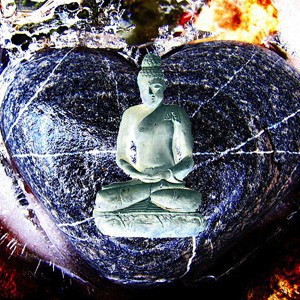Verse 66: The eye of wisdom
Part of a series of talks on Gems of Wisdom, a poem by the Seventh Dalai Lama.
- Understanding the two truths happens gradually over time
- How the ultimate and conventional truths interrelate
- Problems with using the translation “absolute truth”
Gems of Wisdom: Verse 66 (download)
“What is the perfect eye that sees all things in the world and beyond?”
[Audience suggests omniscient mind of Buddha.]
Venerable Thubten Chodron: Getting there, “Clear wisdom that distinguishes the two levels of reality.”
That basically is the omniscient mind of the Buddha.
What is the perfect eye that sees all things in the world and beyond?
Clear wisdom that distinguishes the two levels of reality.
It isn’t like we go from where we are now to automatically understanding and distinguishing the two levels of reality. But it’s something that we develop gradually, over time.
When we talk about the two levels of reality, we’re talking about the two truths. So we have the ultimate truth and the conventional truth.
The conventional truths we’re talking about the appearance level of things—all these things that appear to our senses, that function, that grow and deteriorate, and all of those kinds of things are conventional truths. And then the ultimate truth is the mode of existence. So the ultimate truth is the mode of existence of the conventional truths.
Some people, instead of translating it as ultimate truth they translate it as absolute truth, and I think that can be misleading. Because “absolute” implies that it’s kind of like another reality, very separate from conventional truths. You know, conventional truths are here and absolute truth is completely independent and unrelated. But that’s not it. The ultimate truth—it’s the mode of existence of the conventional truths.
Also, translating it as absolute truth…. To me, anyway, “absolute” indicates kind of independent, and emptiness is the ultimate truth but it is not independent. Because anything that’s independent would be truly existent or inherently existent. And emptiness, too, is dependent.
You may say, “Well what’s emptiness dependent on?” Well, one of the things it’s dependent on is the conventional things that it’s the nature of. Okay? So it’s the idea that the ultimate reality is not in some far off universe somewhere else, and we have to realize something way out there. It’s the ultimate reality is right here. It’s the nature of this (recorder), it’s the nature of this (robes), it’s the nature of me, it’s the nature of you, the room, everything. And the thing is, we’re not seeing it. Okay? And because we’re not seeing the ultimate mode of existence, then we also don’t see the conventional mode of existence in a realistic way. Because our inability to see clearly regarding the objects that conventionally exist makes us think that all those things that conventionally exist have some kind of true existence from their own side, independent of all other things.
That’s the problem with calling it ultimate truth/absolute truth, because we already look at things and think they’re somehow absolute the way they are. And the whole idea is that everything’s dependent.
The conventional truths—some of them are impermanent, some of them are permanent. So the impermanent ones depend on causes and conditions. All phenomena, permanent and impermanent, depend on parts. And all phenomena, permanent and impermanent, depend on being merely labeled. So it’s the same thing with emptiness, even though it’s the ultimate nature how things exist, it doesn’t exist on its own independent of being labeled. It exists by being merely labeled.
This is something that’s sometimes very hard because we like to think of, “Oh, okay, this world is all confused because it’s all conventional. And then emptiness is some universe far away where everything’s peaceful and doesn’t change.” And it’s not a question of location. It’s a question of how we view things.
So attaining realizations isn’t about going somewhere else. It’s about changing the way that we apprehend things right now. So it’s not about making this whole world disappear. It’s about knowing the ultimate nature of this world, and then by knowing the ultimate nature—that it lacks true existence—then being able to perceive this world as a dependent arising, in which case things are going to appear very, very differently to us than they appear right now.
This clear wisdom that sees this is what we need to develop so that we understand conventional truths as dependent arisings, but their ultimate nature is that they’re empty of any kind of independent existence. And those two things go together. Conventionally they exist dependently, ultimately they do not exist independently. In other words, they’re empty. But they still exist.
The lack of independent existence does not mean things do not exist. It’s just we’re negating a false way of existence that our afflicted minds project onto things.
We have some work to do to understand this. But when we do, then we won’t have so many problems and difficulties and misery, because we’ll be seeing things more accurately, instead of through this incredible filter that we have that just makes us so confused all the time.
Venerable Thubten Chodron
Venerable Chodron emphasizes the practical application of Buddha’s teachings in our daily lives and is especially skilled at explaining them in ways easily understood and practiced by Westerners. She is well known for her warm, humorous, and lucid teachings. She was ordained as a Buddhist nun in 1977 by Kyabje Ling Rinpoche in Dharamsala, India, and in 1986 she received bhikshuni (full) ordination in Taiwan. Read her full bio.


